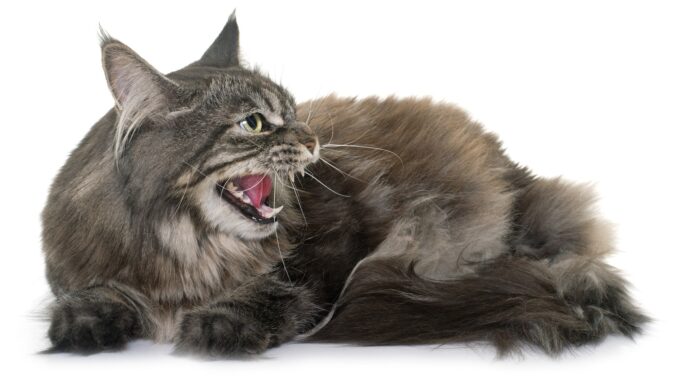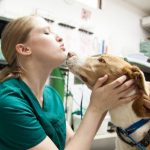
This article was updated on January 31st, 2023
Cats that are above 11 years of age are considered elderly or senior cats. With aging, certain physiological and behavioral changes occur in a cat which may result in making them vulnerable to certain diseases. Signs of aging include decreased mobility, weight loss, increased thirst, and frequent urination.
Elderly cats are also known to yowl excessively even without any particular reason which is considered normal to an extent. Following are some of the possible causes of excessive yowling in elderly cats:
Top reasons causing elderly cats to yowl
1. Cognitive Dysfunction Syndrome
With aging, cats may develop Alzheimer’s disease or cognitive dysfunction syndrome (CDS) which is the decline in their cognitive functioning. CDS in cats is referred to as Feline dysfunction syndrome (FDS) which affects about 50% of cats aged between 11-15 years while 80% in cats aged 16-20 years. This makes them disoriented and irritable. Memory and sleep patterns are greatly affected and this results in excessive yowling.
The observable symptoms of FDS include getting lost in familiar places, wandering, becoming clingy, decreased activity, and the cat may seem anxious. Once you observe these signs you need to contact the vet who may advise you to make certain changes in the cat’s environment and to follow a routine. Anti-anxiety and a few other medications are also advised to make the situation better.
2. Loss of Senses
Elderly cats that have impaired vision or hearing tend to yowl at night as this causes discomfort and irritability to them. Loss of hearing ability often goes unnoticed. This sensory decline can make them look startled and frightened resulting in crying at night.
3. Chronic Illness
With the increasing age, health issues are inevitable. These diseases can be diagnosed in middle age but may become more serious when your cat gets older. Her increased vocalization may be a consequence of one of these chronic diseases. Think about any issues that your cat might have had in the past that could still impact her today.
4. Arthritis
Arthritis is common in elderly cats. Arthritis is a degenerative condition of joints and causes pain and inflammation. It can also result in increased irritability and decreased mobility. You should provide your cat with resting places that are as low as possible to help with their arthritic joints.
Pay attention to changes in your cat’s behavior and physiology, which can be hard to notice because arthritis can slowly, but progressively, impact your elderly cat’s ability to move around the house. This is a serious condition and needs to be discussed with your vet.
5. Hyperthyroidism
Hyperthyroidism along with hypertension can be another cause of yowling in senior cats. Hyperthyroidism results due to increased production of thyroid hormones. The symptoms include increased heart rate, weight loss, diarrhea, and weakness. Cats with hyperthyroidism yowl due to increased stimulation of the nervous system.
With the progression of the disease, symptoms may become worse. If you notice these changes, you must consult your vet who may perform a blood test to determine thyroid concentration in the blood. After which they may prescribe some drugs.
This condition is treatable and early detection helps in the successful treatment of the disease. In severe cases, surgery may be needed to remove the thyroid glands which can be risky for elderly cats.
6. Kidney Disease
Kidney problems can be noticed when the cat is about 8 years of age but sometimes the disease goes unnoticed until it becomes severe.
Kidneys are involved in filtering out the toxins from the bloodstream and red blood cell production in the body. Increased thirst, frequent urination, excessive yowling, and loss of appetite are symptoms of kidney disease which lead to unregulated blood pressure and abnormal production of red blood cells.
For diagnosis, the vet may perform blood tests to determine the level of creatinine and blood urea nitrogen. Increased liquid uptake and a diet with low sodium content can be helpful in this condition. They help your cat stay hydrated. Timely diagnosis helps in slowing down the progression of the disease and improving the quality of life.
7. Diabetes
Diabetes is common in elderly cats. It results due to the inability of the pancreas to produce insulin and decreased ability of body tissues to respond to insulin. This can cause increased thirst and hunger and yowling may be a begging behavior in response to this. Other symptoms of diabetes include increased urination and recurrent infections due to a weaker immune system.
Diabetes is diagnosed by performing certain diagnostic tests which determine the level of glucose in blood and urine. Repeated tests are performed to confirm the diagnosis. Your vet may recommend you to give a diet to your cat that is low in carbohydrates and high in protein.
A diet plan to help your cat in weight loss is also recommended. Other treatment options are insulin injections which are administered twice a day. To increase the insulin secretions from the pancreas, an oral glycemic agent can also be prescribed.
Other reasons causing elderly cats to yowl
1. Hunger
This possible cause of yowling is common in both young and elderly cats equally. Excessive hunger in elderly cats can be a cause of underlying health issues. Providing your cat with plenty of food can help manage the issue if the possible cause of yowling is hunger.
2. Hormonal Changes
Hormonal changes can make your senior cat make excessive vocalization. If your cat is not neutered, chances are she is in heat. On the other hand, a male cat exhibits increased yowling when he can sense a female in heat nearby. So, yowling can be a call made to advertise their receptivity to the opposite gender. Get your cat spayed to get rid of noise at night. You can talk to your vet about getting your cat spayed.
3. Stress
Your cat may yowl at night just because she is stressed due to any changes made in the house or the arrival of a new pet or a baby. In case you are unable to find any possible cause of stress, giving them attention and cuddling might solve the issue. They like being social with people and want to be played with or talked to. A cat that feels lonely is more likely to show this behavior.
The Final Word
For elderly cats, you need to make a few adaptations in your house. These changes include providing more cozy spaces for sleep, an indoor litter box, and an age-appropriate diet to help them with aging. Excessive yowling could be due to any of the above-mentioned conditions which need to be diagnosed. They are very much treatable and can lessen the pain of your cat while ridding of the discomfort that comes with it.
Disclaimer: This website's content is not a substitute for veterinary care. Always consult with your veterinarian for healthcare decisions. Read More.


Be the first to comment